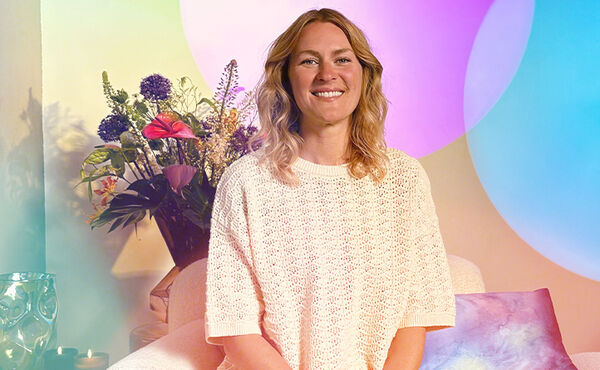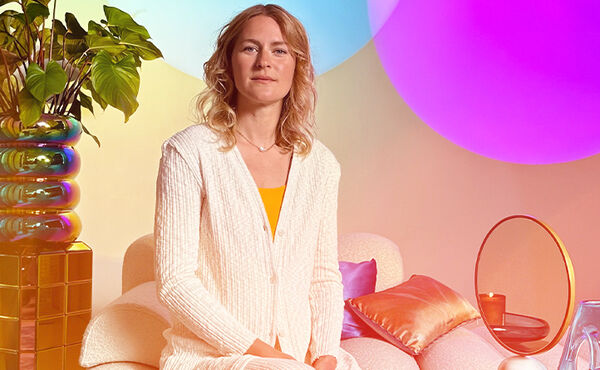Whether you procrastinate, overthink or are stuck in a cycle of comparison - you’re zapping precious mental energy that could be used for creating joy and happiness instead. Here’s how to crack the habits once and for all.
It is estimated that the average adult makes 35,000 decisions a day, some of them will be good and inevitably some won’t be. It’s a lot to deal with which is why it's only natural that, sometimes, rather than dealing with what's in front of us we waste time and energy overthinking or finding it all so overwhelming that we get to the point where we feel we’re incapable of making a decision; hello procrastination. And then there's the infliction of comparison where we spend energy projecting other’s decisions onto our own. But by taking control of our thoughts, we can claim back some of that energy and use it in better ways. We got clarity and life coach, Victoria Joy, who specialises in helping people find ways to make life easier, to explain exactly how we can increase our mental energy once and for all.
How to stop overthinking
Joy believes that overthinking often gets confused with anxiety. “Anxiety is a recognised mental health diagnosis. Overthinking is thinking about situations, choices or people to an unhelpful degree and expending your energy where it's completely unnecessary.” She also believes that thinking too much is not a personality trait, it is a habit that can be changed as soon as you acknowledge that your thoughts and how you think is within your control.
“Cognitive overload is a real thing and we do get decision fatigue. I often use the example that the open tabs on your computer are a great insight into the open tabs in your mind.” How can you close down some of those tabs to free up some energy and get more clarity when it comes to thinking? “You need to start by streamlining the regular decisions you make. This will then help you to establish habits to reduce overthinking. For example, if you overthink what to wear the next day - limit your choices by switching to a capsule wardrobe and plan your outfit the night before. Barack Obama once said he only wears two types of suits because he had bigger decisions to make. If you find you're constantly staring at the fridge wondering what to eat, plan your meals for the week so you only have to do one shop and the decision is made.”
Once you've tackled the daily decisions you can take the same approach for bigger things. “If you're trying to book a holiday, simplify your options and make one decision at a time. Hotel or villa? One week or two? Half-board or all-inclusive? Then you will get yourself to a place where you can make a manageable decision."
We often overthink because we are always searching for the best possible outcomes. “Overthinking is closely linked to perfectionism,” says Joy. “We prevent ourselves from making decisions because we want everything to be the best and that's unsustainable and unnecessary. Take a step back and identify where you are spending too much energy when you can just make a decision. And if it’s the wrong one, that’s ok. Learn from it and move on.”
Your mindful energy takeaway: Prep your outfits or meals for the week ahead in one go and see what effect it has on your mental energy levels day-to-day.

How to stop procrastinating
Procrastination is where you delay big or difficult tasks by filling your time doing easier, more enjoyable things which unfortunately just delays the inevitable – that big or difficult tasks needs to get done sometime. Procrastination is also closely linked to multitasking, the more things we do “at once” the busier we are and the more productive we think we are, but humans aren’t designed to multitask. “There’s amazing research that proves that the human brain is not engineered and wired to multitask but because we do, everything ends up taking longer, feels more stressful and we're more likely to make mistakes. Just acknowledging this fact is beneficial.”
However, things still need to get done, so what’s Joy’s advice on how to approach things when it all feels overwhelming? “Take five-to-ten minutes at the start of every day and time block your day. Break it up into hours or segments, and make a plan of how to focus your energy. That ten minutes will pay you back later in the day, I promise.” Many of us know when our energy levels naturally rise and fall, for example, don’t plan those less enjoyable tasks in the afternoon if that’s when you tend to run out of steam.
By doing this you are taking control of your energy levels, something Joy also says you have to do when you're in the depths of procrastination. “You may need to tell yourself to ‘do the damn thing’. Even if it's just unloading the dishwasher. Do it and do it completely because you can tick it off in your head entirely.”
She also believes technology plays a huge part. “Devices are designed to keep your mind distracted and not on the job at hand,” says Joy. But technology can be used for good. “The most productive app on your phone is airplane mode. If you have a big task that has to be done, set it so you can’t get distracted. You can also set specific device-free spaces in your house to keep your mind focused.” Joy also advocates using reminders and alarms on your phone to help stave off procrastination. “Set reminders for all the small tasks you have to do, like putting a wash on or booking a doctor's appointment. If they're in your phone then it’s another open tab in your mind that you can close down.”
Your mindful energy takeaway: Try planning your tasks for tomorrow first thing in the morning and decide what you will do and when, taking your energy levels into account. For example, if you’re an early bird front-load your day. Before bed, take a moment to think about whether this planning helped relieve your mind and whether you were able to get more done than usual.
How to stop comparing yourself to others
There’s not a person in the world who hasn’t compared themselves to someone else - whether it’s the house they live in, the partner they have, or the life they seem to lead. And again, much like with overthinking and procrastinating, Joy says it’s important to know this is natural. “Comparing ourselves is a very basic animal instinct. We did it because we needed to know where we were in a pack. It’s what kept safe and helped us survive.” But in this modern world there’s a fine line between a healthy dose of comparison and becoming obsessive. “If there are certain things you find you are continually comparing yourself to, then it’s about turning the mirror back on yourself and looking at that particular area in your own life and asking yourself how happy and fulfilled you are. You can’t control what other people are doing but you can ask yourself ‘what can I do that’s in my control?’”
And because so much of our comparison comes from what we see on social media, that’s a good place to start to lessen your comparison tendencies. “Remember only you are in control of your phone so take back that power and give your social media an audit. Clear out all the stuff that isn't serving you, makes you feel bad and triggers comparison in a really negative way - whether that means unfollowing, muting or blocking people. Then think about what you do want to see and what will make you feel good, seek out more of that and the algorithm will follow.”
You may need to take a similar approach to your in-real-life relationships too. “If there's someone in your life that you are constantly comparing yourself to and it all gets a bit competitive give a bit of thought to if the bad is outweighing the good. Ask yourself, ‘do I get lots of loveliness from this relationship?’, if you don’t then don’t waste your energy anymore.”
Your mindful energy takeaway: After a bout of social media scrolling, rank how you feel about yourself on a scale of 1 (bad) - 10 (super happy). Now remove any accounts that trigger unhealthy comparison. Give it a week, and then try rating your self-perception after another bout of scrolling and see whether that number has improved.
This article is part of our energy masterclass, to help you fill your life with positive energy and unlock your full potential. For a more positive outlook on life, our energy masterclass reveals everything you need to know to energise your body, mind and soul in small, easy, ways. Delve into our series of inspiring articles, videos and an exclusive soundscape - designed to help you feel more energised - that can be completed individually or as a 72-hour masterclass.





